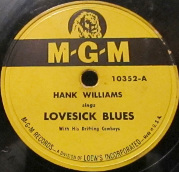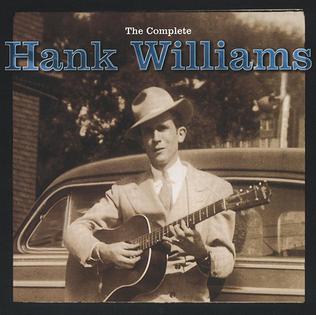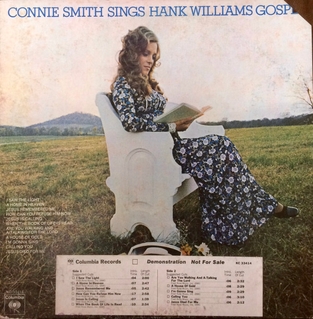
Roy Claxton Acuff was an American country music singer, fiddler, and promoter. Known as the "King of Country Music", Acuff is often credited with moving the genre from its early string band and "hoedown" format to the singer-based format that helped make it internationally successful. In 1952, Hank Williams told Ralph Gleason, "He's the biggest singer this music ever knew. You booked him and you didn't worry about crowds. For drawing power in the South, it was Roy Acuff, then God."
Knowles Fred Rose was an American musician, Hall of Fame songwriter, and music publishing executive.
"The Great Speckled Bird" is a hymn from the southern United States whose lyrics were written by the Reverend Guy Smith, and transcribed by singer Charlie Swain. It is an allegory referencing fundamentalist self-perception during the Fundamentalist–Modernist Controversy. The song is in the form of AA, with each section being eight bars in a two-beat meter, with these sixteen bars forming the musical background for each verse. It is based on Jeremiah 12:9, "Mine heritage is unto me as a speckled bird, the birds round about are against her; come ye, assemble all the beasts of the field, come to devour." It was recorded in 1936 by Roy Acuff. It was also later recorded by Johnny Cash and Kitty Wells, Pearly Brown (1961), Hank Locklin (1962), Marty Robbins (1966), Lucinda Williams (1978), Marion Williams, and Jerry Lee Lewis. George Jones & The Smoky Mountain Boys also recorded it in the early 1970s.

"Lovesick Blues" is a Tin Pan Alley song, composed by Cliff Friend, with lyrics by Irving Mills. It first appeared in the 1922 musical "Oh, Ernest", and was recorded that year by Elsie Clark and Jack Shea. Emmett Miller recorded it in 1925 and 1928, followed by country music singer Rex Griffin in 1939. The recordings by Griffin and Miller inspired Hank Williams to perform the song during his first appearances on the Louisiana Hayride radio show in 1948. Receiving an enthusiastic reception from the audience, Williams decided to record his own version despite initial push back from his producer Fred Rose and his band.

"I Saw the Light" is a country gospel song written by Hank Williams. Williams was inspired to write the song while returning from a concert by a remark his mother made while they were arriving in Montgomery, Alabama. He recorded the song during his first session for MGM Records, and released in September 1948. Williams' version did not enjoy major success during its initial release, but eventually it became one of his most popular songs and the closing number for his live shows. It was soon covered by other acts, and has become a country gospel standard.

"Kaw-Liga" is a country music song written by Hank Williams and Fred Rose.

Audrey Mae Sheppard Williams was an American musician known for being the first wife of country music singer and songwriter Hank Williams, the mother of Hank Williams Jr. and the grandmother of Hank Williams III and Holly Williams.

The Complete Hank Williams is a 1998 box set collecting almost all of the recorded works of country music legend Hank Williams, from his first recorded track in 1947 to the last session prior to his untimely death in 1953 at the age of 29. While a number of live and overdubbed songs are excluded, the ten disc collection contains 225 tracks, including studio sessions, live performances and demos. Among those 225 songs are 33 hit singles and 53 previously unreleased tracks.
Acuff-Rose Music, Inc. was an American music publishing firm formed in 1942 by Roy Acuff and Fred Rose in Nashville, Tennessee, United States. Acuff-Rose's honest behavior towards their writers set them apart from other music publishing firms at the time and led them to fame throughout the 1950s, 1960s, and 1970s. Currently, the company's catalog is owned by Sony Music Publishing (US), LLC (Delaware).

Connie Smith Sings Hank Williams Gospel is the twenty-fifth solo studio album by American country singer Connie Smith. It was released in May 1975 via Columbia Records and contained 11 tracks. The project was a tribute to Hank Williams and was considered the first tribute gospel album of his material. Smith had found over half of the album's material through previously-unreleased recordings. The album would make a brief chart appearance on the American Country LP's survey in 1975.
"At Mail Call Today" is a song written by American country music artist Gene Autry and Fred Rose. The two had a successful song writing partnership dating back to 1941, including "Be Honest With Me", "Tweedle-O-Twill" and "Tears On My Pillow". Rose, with Roy Acuff, founded Acuff-Rose Music Publishing in 1942, and in 1947, would go on to producing Hank Williams. Autry, after a brief lull in film making due to WWII, would be back to his pre-war output by 1946.
"Pan American" is a song written and recorded by Hank Williams. It was his final single on Sterling Records after moving to MGM in April 1947.
"Calling You" is a hymn written and recorded by Hank Williams.
"A Mansion on the Hill" is a song written by Hank Williams and Fred Rose and originally recorded by Williams on MGM Records. It peaked at No. 12 on the Most Played Jukebox Folk Records chart in March 1949.

Memorial Album is the first Hank Williams LP issued by MGM Records after the singer's death on New Year's Day 1953.
"The Battle of Armageddon" is a hymn written by Roy Acuff and Odell McLeod. It warns of the coming Judgment Day and references the Book of Revelation. The song became associated with Hank Williams when MGM Records released it as a posthumous single. Between January and May 1949, Williams had pre-recorded early morning radio shows for Johnnie Fair Syrup, and MGM issued several songs from the surviving acetates as singles to satisfy the unyielding demand product by the late country singer, who was quickly becoming a mythic figure in country music. Co-writer Roy Acuff had been a primary influence on Williams' music. Williams pronounces "Armageddon" as "Am-be-gotten" and usually ignored his producer Fred Rose's demands that he enunciate his words with more sophistication.
"Faded Love and Winter Roses" is a song written by Fred Rose. It was released as a posthumous single by Hank Williams, whose records Rose produced, in 1954.
"Mother Is Gone" is a song by Hank Williams. It had appeared in Williams' song folio in 1946 and was released as a posthumous single by MGM Records in 1955. The narrator in the song laments the passing of his mother, one of several compositions that Williams wrote containing a maternal theme that was likely influenced by Roy Acuff and other singers who recorded similar songs. The original recording was a demo Williams made for publishing company Acuff-Rose sometime between 1946 and 1949.
"No One Will Ever Know" is a song written by Fred Rose and Mel Forre. It was originally associated with country icon Hank Williams when it was issued as a posthumous single in 1957.







